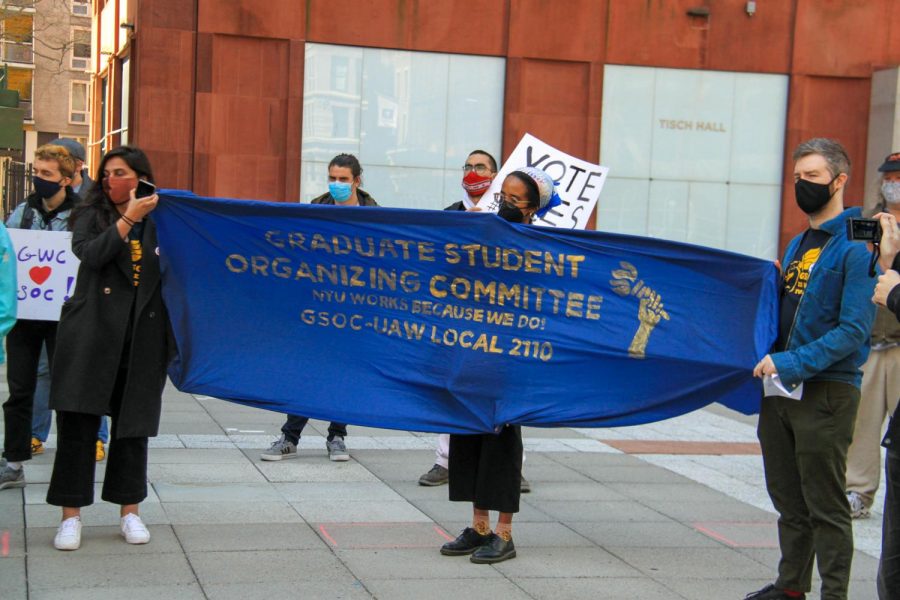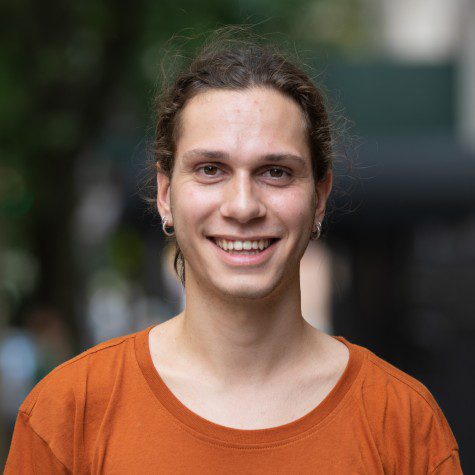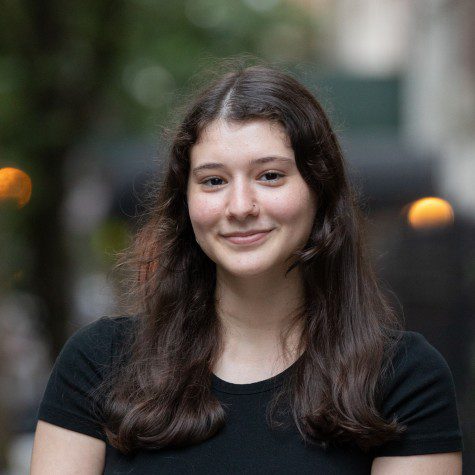GSOC authorizes potential strike
More than 96% of participating union members voted to authorize a graduate student worker strike.
The members of the Graduate Student Organizing Committee have voted to authorize a strike. The strike authorization voting period started March 23 and ended April 9, with more than 96% of participating union members voting to approve the potential action. (Staff Photo by Alexandra Chan)
April 12, 2021
Members of the Graduate Student Organizing Committee voted to authorize a strike, with 96.4% of participating union members voting to approve the potential action. The results do not necessarily mean that graduate student workers will strike, but rather that the GSOC bargaining committee is now empowered to call a strike.
“NYU can’t run without our labor,” GSOC wrote in a press release regarding the results. “That puts a ton of pressure on NYU to meet our demands for a living wage, improved healthcare, protections against power-based abuse, tuition remission, health & safety protections like getting cops off campus, and support for international workers.”
The strike authorization voting period started March 23 and ended April 9. Out of 1,386 participating union members, 1,336 voted to authorize a strike.
According to Anila Gill, a fifth-year Ph.D. student in Cinema Studies and member of the GSOC bargaining committee, GSOC represents around 2,200 graduate student workers at NYU, but does not have a final headcount of eligible voters and therefore cannot calculate a concrete percentage for voter turnout.
The GSOC bargaining committee is currently discussing strategies for setting a strike deadline.
“Regarding questions of strategy, we can’t discuss these issues directly since they are the subject of ongoing internal discussions,” GSOC wrote in an email statement to WSN. “All these decisions ultimately depend on how NYU chooses to respond in upcoming bargaining sessions.”
“Decisions regarding the strike, deadlines, and negotiations are shaped by what happens at the bargaining table,” Gill clarified in a text to WSN.
GSOC and NYU have been bargaining over a renegotiated contract for more than nine months, since GSOC’s previous contract expired in August 2020. As WSN previously reported, GSOC is demanding a living wage of $38 an hour (negotiated down from $40 an hour), free healthcare including dental care, a severance of ties between NYU and the NYPD, and fixed childcare subsidies. They also want lower-cost access to tax accountants and immigration lawyers, housing and transit subsidies, and an extension of paid sick leave from five days to 30 days per academic year.
In response to GSOC’s demands, the university proposed a wage of $21 an hour and paid sick leave to seven days per academic year. It rejected demands to sever ties with the NYPD and to offer subsidized access to legal assistance and reimbursement for tax consultation services.
Fourth-year History and Middle Eastern & Islamic Studies Ph.D. student Ellis Garey clarified that while on paper, the seven-day paid sick leave looks like an extension to the current five-day leave, in practice, it could serve as a reduction.
“Our current contract guarantees a minimum of 5 sick days, but does not stipulate a maximum and graduate workers have successfully taken sick leaves for multiple weeks because of this contract protection,” Garey wrote in an email to WSN.
According to the union, the university is stonewalling negotiations by rejecting the majority of the GSOC’s proposals and failing to make meaningful counterproposals for the rest. According to the university, the bargaining stalemate is the union’s fault.
“The strike vote, unfortunately, is premised on a false narrative that the Union has spun: that the University hasn’t made meaningful proposals and concessions, or that the University is ‘stonewalling,’” university spokesperson John Beckman wrote in an email statement to WSN. “All of that is false. In fact, it is the Union that has been responsible for the slow progress of bargaining. NYU has been bargaining seriously and in good faith for many months.”
According to Beckman, NYU is proposing doubled subsidies for childcare, expanded subsidies for healthcare, “weeks of paid family leave” and six years of pay raises that would increase hourly wages — currently at $20 — by 20%.
“GSOC remains fixated on issues that are outside the scope of bargaining or on excessive demands, such as a near-doubling of hourly wages,” Beckman wrote. “Bargaining doesn’t mean that the University says ‘yes’ to every demand, no matter how unreasonable or costly.”
The last time GSOC authorized a strike was in 2015 when 95% of participating union members voted to endorse the strike. The university and the union agreed on a contract the night before the strike was set to begin, resulting in terms that included a 100% increase in wages for grad student workers.
GSOC has yet to decide if they will move forward with the strike and when it will begin, but third-year American Studies Ph.D. student Chloe Truong-Jones, a member of GSOC’s bargaining committee, told WSN that graduate students would not strike if it were not absolutely necessary.
“An almost-unanimous yes vote shows that graduate students are really hurting, in terms of living conditions [and] working conditions,” Truong-Jones said. “NYU was not meeting their needs and they’re ready to take action in response. So I think if NYU continues to stonewall, to not engage with the demands, to not take the needs of graduate workers seriously, then we are ready to strike.
Truong-Jones supported GSOC’s statement that NYU depends upon graduate student labor, noting that a strike would greatly impact the functioning of the university and the ability of undergraduate students to do well in their classes.
“We really care about our students,” she told WSN. “That being said, learning conditions for undergraduates are by nature tied to working conditions for graduate workers, so our strike will impact the ability for undergraduates who are the source of revenue for the university, to be able to attend recitations, and for the university to continue to function.”
Second-year History and Middle Eastern & Islamic Studies Ph.D. student Laith Shakir believes that graduate students’ ability to teach is dependent on their ability to live and work in New York City.
“I teach because I really care for my students,” Shakir told WSN on Zoom. “If we don’t get a contract that allows us to basically work and live in New York City, the very first place where those difficulties will sort of manifest is in the classroom.”
Shakir’s undergraduate students have been extremely supportive of the strike.
“I’ve had [many students] asking how they can support us,” he said. “I think they really do care about the quality of their education, but also care about their instructors, that’s been really heartening.”
This solidarity between undergraduate and graduate students is something that Garey has noticed in her classes as well. She believes that this solidarity is in part because a large number of undergraduate students are also employed by the university and are not paid a living wage.
“We do see ourselves as bargaining for the common good,” Garey told WSN on Zoom. “We believe that many of our contract demands would not only impact our working conditions, but also the broader and wider community, and would really be an improvement for everyone.”
Fifth-year Comparative Literature Ph.D. student Smaran Dayal was not involved in strike planning, but believes the demands of GSOC make perfect sense — especially since the cost of living in New York City is much higher than that of smaller cities.
Like the majority of international graduate students, Dayal attends NYU on an F1 student visa, which means he is not allowed to work off-campus and is therefore completely dependent on the university for his income. Without sufficient income, many international graduate students must weigh the pros and cons of finishing their degrees.
“I’ve heard talk of people either considering dropping out or actively having to drop out,” Dayal told WSN. “It can be really devastating. Imagine working through a really rigorous Ph.D. program, reaching your ultimate or your final year, and then having no options.”
Aside from the demands for higher wages, GSOC is bargaining for health and safety demands including removing the New York Police Department from campus buildings. Students such as Truong-Jones and Dayal do not think universities should collaborate with law enforcement agencies, including the NYPD and U.S. Immigration and Customs Enforcement. Dayal said NYU is putting undocumented students at risk by cooperating with ICE.
“Universities have always been a haven for education and for research,” he said. “If we’re talking about building safe spaces for LGBTQ students [and] students of color, we also need to make sure that NYU is a safe space for undocumented students.”
According to Truong-Jones, one of the obstacles that prevents NYU from being a safe space for students is the university’s relationship with the NYPD. She criticized NYU’s disregard for GSOC’s demands regarding the NYPD.
“I think that this is a really important moment to bring attention to NYU’s complicity in state and police violence,” Truong-Jones said. “We’re hoping that NYU will recognize and engage with us on this, and that we also can gain the support of everyone else who cares about this issue.”
Correction: A previous version of this article incorrectly stated that NYU’s counterproposal included 90% coverage of healthcare premiums. Graduate workers already received a 90% discount in 2015.
This article has been updated with two additional interviews from Laith Shakir and Ellis Garey.
A version of this article appeared in the Monday, April 12, 2021, e-print edition. Email Trace Miller and Rachel Fadem at [email protected].


























































































































































